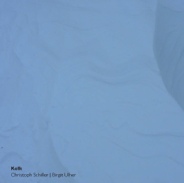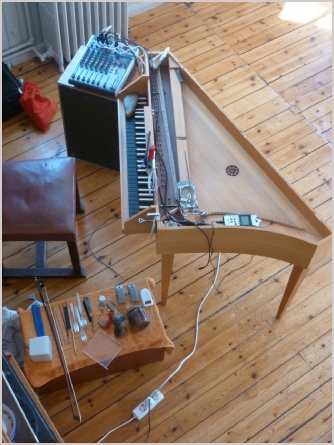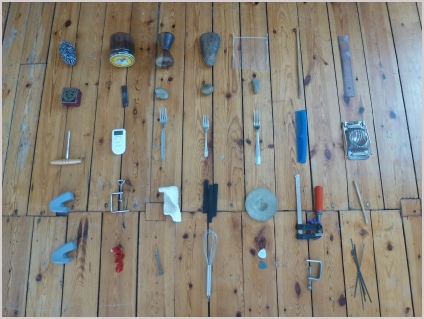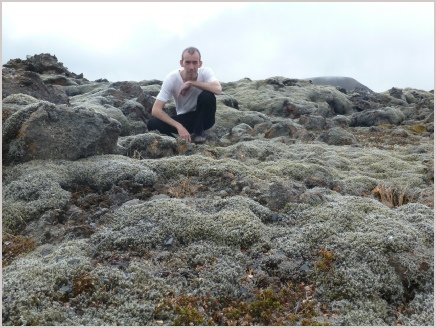Another Timbre TimHarrisonbre

at52 Kolk
Christoph Schiller spinet & preparations
Birgit Ulher trumpet, radio, speaker, objects
1. Auflast 5:33
2. Sediment 6:38
3. Geröll 10:12
4. Kolk 7:42
5. Bult 4:23
Recorded in Hamburg, October 2010
Interview with Christoph Schiller
First of all, why the spinet?
I used to play the piano, the spinet came later. I’d always been unhappy with the fact that as a pianist you can’t usually play concerts on your own instrument, or sometimes there’s no instrument at all. Maybe ten years ago, I got a spinet so that I could play baroque music on a more or less appropriate instrument, and after a while I started trying it for improvised music too. Having taken the decision to develop it for my own purpose, I spent almost a whole year adapting my inside-piano techniques to it, and developing new techniques. It worked well. My first thought was to use it as an alternative to the piano, but soon I abandoned piano completely. As I was interested in ‘small’ sounds, I’d also been unhappy with the massive body of the piano. The spinet is a much lighter, smaller instrument; I can even travel with it.
Also there’s less tension on the strings, and this provides other possibilities, for example when working with an e-bow. I generally like the light sound of the instrument. Even though I play it in a way that’s far removed from its ‘original purpose’, it keeps its character, and funnily enough it works very well with instruments that it "knows" from the baroque world: viola da gamba, violin, recorder. But it also sounds good in electronic contexts. The strings are plucked (when played from the keys), and this makes it much easier to mix inside techniques with keyboard playing, as compared to the piano.
With the piano I always felt aware of the history of piano music behind me. I don’t think this is just an intellectual thing, it also has to do with the way sound is produced in a piano. This is a very special technique. The spinet is simpler in its sound production, and perhaps this is why I feel much freer with the spinet. I know its history (baroque music), but I can still use it as if there was no history at all, as I was inventing the instrument completely anew. The spinet and harpsichord didn’t play any role in the music history of the 19th and half of the 20th century.
The spinet might be exotic in improvised music; but my instrument isn’t just the spinet, but also the preparations and the way I play it. Looked at from this angle, it’s no more exotic than a guitar or a laptop or a trumpet.
So can you tell us a bit about the preparations you use? When I’ve seen you play, you seem to use quite a variety of objects.
I use some small stones, a piece of metal and a glass for either putting on the strings (to shorten or open them), or for placing on the bridge to create distortion effects. And a larger stone for putting on the lower keys to open the strings (‘pedal’), as well as some forks, a piece of polystyrene, and various little objects - amongst others, a chopstick, a small cymbal attached to the instrument, and an egg-slicer which holds a ruler. I use a cello-bow for playing on the attached objects and the wooden body, and sometimes even on the lowest string. Also I have two e-bows. I play the strings via the keys or directly with my fingers, plucking or rubbing. For some time I’ve also placed a Zoom Hn4-recorder inside in the instrument, for recording and immediate playback, over the little built-in loudspeaker. I usually mix this with the same or similar sounds ‘live’, so it's not always clearly recognisable. On the recording with Birgit I also had a very good cheap kind of fan, but it didn't last very long, and I couldn’t find the same model again. I’m always working on varying the combinations of all these and finding new aspects. It is indeed a large variety.
Currently I’m working on a new set-up using some electronics: a pick-up, a microphone, the Hn4 again, and a mixing board. So it’s even more stuff! But things come and go, and some objects might disappear after a while, if I find that I don't use them. The spinet itself is one of the objects in a way, even though the most important one.
OK, now onto the disc. Before the music, what about the titles: Kolk, Auflast, Sediment, Geröll and Bult. What are these referring to, and why?
They’re all geological terms, referring to the formation of landscape. ‘Kolk’ is the basin that is washed out under a waterfall, or even under very small "waterfalls". ‘Auflast’ is a term referring to the process in this situation. ‘Bults’ are small grass "islands" which occur in a marshy landscape. In a way it's the opposite of Kolk, as it’s a positive form, while Kolk is a negative one. Sediment is a geological shift (material sinking to the ground and forming a layer) and ‘Geröll’ means boulder. All those terms describe landscape features in a certain state, as result of a long-term "sculptural" process, a process that may not be finished, but which is going on very slowly. We don't claim that the process of our music making is as slow as geological developments, but we bring the terms and the music together to achieve maybe a certain point of view. Birgit and I have known each other for a very long time, although we have not always played together during this time. But there are, for example, common "sedimental shifts" in our artistic history, and the music on the disc is the culmination of a long-term development - but as with the geological features too, it’s certainly not the end of the process, but a statement of "now".
It strikes me that 90% of your music that I've heard has been in a duo setting. Is that a form that you particularly like, and if so why?
This is not a concept, but yes, I like playing in duo very much. Maybe because it’s intimate, and the system of communication is simple and clear. But there are also practical reasons: it's easier to find dates, and it's easier to find possibilities to play concerts, whereas trios and of course larger groups are always more difficult to organise. I play a lot with different people, and duo-playing is the easiest way to be flexible inside the network. But I do also play in other constellations, larger groups, and I like that too! There are even some very large ones, like the IMO improvising orchestra in Switzerland, as well as my vocal ensemble Millefleurs and Carl Ludwig Hübsch’s Ensemble X in Cologne. Then I also play solo, but not so much. I really want to do a solo CD as well, but I haven’t yet, because I always think I can do it later... it's like visiting tourist spots in your own town: you never do it, because you think you could go there any time. So you only go there with friends from abroad - and then it's a duo again!
Yes, I certainly hear those qualities of intimacy and clear communication in your duo with Birgit. But I think there's also something else in play that I like: a kind of integrity. While, as you say, your music has undergone geological shifts over the years, neither you nor Birgit seems to follow fashions in music. You're both clearly aware of current developments in improvisation, but engage with them in ways that retain your particular history or personality intact. It's an approach that I like very much, but I wonder if it has led you into being a more marginal figure than you might have been if, say, you'd embraced 'Reductionism' as a disciple in an evangelical way?
I think what you call integrity is essential in any artistic work or career. Maybe you're right when you say that I am a rather marginal figure, but I don't know if there is a choice - artistically. There are always many possibilities, but are they really serious possibilities? I think the "freedom" in improvised music is mainly the freedom of finding one's own way, or own solution.
I was and am very aware of, for example, reductionism; it is very important music and there are extremely important ideas in it, that have of course also influenced me. But I think that none of the main protagonists has "followed the style" in order to achieve these results; rather the results are the outcome and consequence of an artistic development. I'm not explicitly trying to "keep distance from stylistic trends", I just don't copy them. There is no point in copying the styles, and I mistrust any rules which pretend to offer a final solution.
For a long time my work was much more marginal than it has seemed in the past couple of years. I learned to do my own stuff, and to follow my artistic instinct and conscience, because I wouldn’t have been tempted by any "success" whatsoever. I am quite content with my situation as it is now. I can do my work, and that's fine.
Yes, that makes sense. I’m curious to know exactly how the pieces on ‘Kolk’ were made. Were they totally improvised, or did you agree to work in certain areas prior to recording each piece, and were they shaped later on through editing?
All pieces are freely improvised. We had recorded a lot of material in one session from which we selected the takes we liked. After this we worked on the order and chose some pieces with regard to a through form (of the cd).
The pieces were all played as they appear on the disc - except that sometimes we edited out sequences before or after the piece. But there was no post-production work except for this selection and putting the tracks in an order. However, there was quite a lot of work mixing some small details, and I am very grateful for the help of Boris Vogeler, our sound engineer.
Reviews
“Étrangement, j'ai l'impression que Birgit Ulher ne fait jamais de disque de plus de quarante minutes. Comme si elle avait peur d'ennuyer ou de fatiguer l'auditeur avec ses méthodes d'exploration radicale et extrême de la trompette. Car si sa musique et ses couleurs sont passionnantes, c'est tout de même dur d'écoute, dur pour ses aspects bruitistes, extrêmes et minimalistes. Ceci-dit, c'est loin d'être critique envers la forme des improvisations pratiquées par cette musicienne, je dis ceci plutôt par admiration, car c'est extrêmement agréable de ressentir l'attention qu'elle peut porter au public, tout en ne faisant aucun compromis.
Pour Kolk, c'est Christoph Schiller (épinette, préparations) qui accompagne Birgit Ulher (trompette, radio, haut-parleur, objets). Ensemble, ils improvisent cinq courtes pièces où les aspects abrasifs et granuleux de la trompette étendue sont contrebalancés par la douceur et la délicatesse de cette sorte de clavecin qu'est l'épinette. De toutes manières, malgré les couleurs bruitistes et extrêmes, malgré l'absence de formes mélodiques, malgré les oppositions entre les deux musiciens, il y a toujours une forme de sensibilité et de délicatesse dans cette suite. Chacun de ces improvisateurs porte une grande attention à l'écoute, mais aussi à l'espace et au silence. Chaque pièce paraît être une mise en scène de l'espace sonore. Mise en espace du son et scénographie du bruit, deux formes qui amènent Christoph et Birgit à une exploration sonore intense des instruments comme de l'espace. Une exploration profonde, comme on peut s'y attendre de la part de ces deux musiciens, qui font sans cesse preuve d'originalité et de créativité avec une étendue impressionnante de techniques étendues, de préparations instrumentales, et de recherches sonores pures.
L'interaction entre les deux musiciens est profonde et intime, sans pour autant être dans un jeu d'imitation. Chacun possède son propre vocabulaire, singulier et original, mais chacun soutient l'autre dans une direction unique. Il s'agit de construire un seul et même espace, à l'aide de son propre langage, mais la singularité de chacun, même si elle est pleinement affirmée, tend à se fondre dans la recherche sonore et spatiale. Deux fortes personnalités au service d'un espace sonore à la fois, au service d'un univers sonore par pièce. Je parlais plus haut de l'attention de Birgit au public, mais celle-ci ne s'arrête pas là. C'est aussi à ses collaborateurs que Birgit porte une attention exceptionnelle. Il y a une forme de grande attention et de respect entre chacun, il y a toujours de la place et de l'espace pour le discours de l'un comme de l'autre, qu'il soit calme, bruitiste, silencieux, granuleux, harmoniques, corrosifs, etc. L'inventivité de chacun trouve sa place à tout moment, sans que jamais l'un ou l'autre prenne le dessus ou la direction.
Une suite d'improvisations intenses, profondes, et riches en couleurs, complètement exempte de hiérarchies. Une forme égalitaire et alchimique de dialogue entre deux univers distincts qui se mélangent pour former un espace de recherche, d'exploration et de créativité exceptionnelles. Très bon.”
Julien Heraud, Improv-Sphere
“Schiller plays a spinet (prepared), not an instrument one encounters everyday in this field. Given the preparations, one is hesitant to say anything about its basic sound, but given that it's variously defined as both a kind of harpsichord and piano, my impression of its being about midway between seems about right. In any case, it's a fine fit with Ulher's grainy, unpredictable trumpet and, at best, produces some choice moments. The duo isn't the easiest nut to crack and it took this listener some metaphorical shifting around in my seat to get comfortable, to sync myself with the flow. This is often the case, for me, with Ulher's music (on disc, that is; live it's as natural as breathing); I'm only marginally familiar with Schiller's work but perhaps it's the same. Sonics aside, it doesn't particularly stand apart from other work in the sphere but it's simply good, solid, gnarly music and some days, like this morning, that's enough.”
Brian Olewnick, Just outside
“Some straight down the middle improv tonight then courtesy of Christoph Schiller and Birgit Ulher’s Kolk album on Another Timbre. Schiller plays spinet, a modified, prepared version of the early predecessor to the piano, and Ulher plays trumpet, with a radio, speaker and assorted other items added. On previous albums I have written about Ulher places a tiny speaker inside the bell of her trumpet, so that it can play sounds (presumably here from the radio) as she also plays the trumpet more conventionally. In fact there is little conventional about how the trumpet is used here, and the same should be said for the spinet as the duo make their music through a search for new and extended techniques for their respective instruments.
This review began by calling the album straight down the middle improv, which I think is an accurate statement in light of all the assorted conceptually assembled or digitally compiled albums I have written about of late, but its a hard to one pin down as belonging to one particular area of improv over another. The opening track Auflast sits maybe where we might expect it, full of growling metallic trumpet sounds and scraping, tinkling and whirring prepared spinet, not necessarily fast and frenzied, and using unfamiliar, textural sounds over straight instrumental playing but essentially an evenly balanced improv session that is a nice, if perhaps unremarkable listen. The second piece here though, the much more spacious and fragmented Sediment is a more interesting affair. Here the duo exchange tiny fragments of sound, initially quite slowly and with space between each of them, albeit not long spaces. As the track develops it becomes a little more fluid, but essentially throughout the music is made up of short, sharp stabs of sound that when assembled together form some kind of pointillistic discussion that sits as a pleasing contrast to the opening track. The third piece seems to combine the two approaches, with Ulher putting the radio to use to feed white noise through her instrument as Schiller picks and scrapes at smaller sounds he sprinkles over the top, the track gradually breaking from this formula to slide into a vaguely rhythmic routine of combined abstractions that I would struggle to identify as coming from these two instruments if I wasn’t already aware.
The other two tracks here inhabit a more familiar territory- slow, spacious and generally quite restrained meshes of hissing, popping, scraping and chiming improvisation, the qualities of the actual sounds as important as their placement, the way the two musicians’ contributions combine more important than any individual instrumental showmanship. The interplay is frequently lovely, the subtlety in the musical conversation marked, the confidence in the musical solutions chosen here to the natural problems of free improvisation pronounced, but in some ways, this is your average, everyday album of strong improvised music. Its an album I enjoyed listening to quite a bit on this dreary wet Sunday. Its a good CD but its also one likely to be consigned to the shelves and remembered merely as a good album of modern improv than something to be taken down and played again any time soon. Both musicians are fine improvisers, and this album is a nice showcase for their collaboration, but given that CDs of improvised music continue to tumble out into existence faster than anyone can listen to them there might not be enough of a spark here to stop Kolk getting lost amongst the crowds, which is an unfortunate, if perhaps inevitable shame. Maybe one of the best AT cover images I have seen yet however.”
Richard Pinnell, The Watchful Ear
Christoph Schiller




Discount price £5